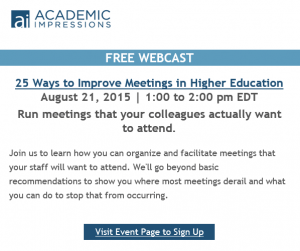Academic Impressions (AI) is an organization that seeks to serve higher education professionals via educational products and services that help institutions tackle their challenges. AI offers webcasts, conferences, on-campus workshops, and news publications.
 25 Ways to Improve Meetings in Higher Education – Run Meetings that Your Colleagues Actually Want to Attend
25 Ways to Improve Meetings in Higher Education – Run Meetings that Your Colleagues Actually Want to Attend
SMU HR will be hosting this webinar on improved meetings in higher education settings in the HR Training Room. Get away from office distractions, watch with your peers, and have a brief discussion afterwards. Encourage your team members to attend as well!
August 21, 2015 from 12:00 – 1:00 p.m.
HR Training Room – Expressway Towers, Suite 208
Here’s what you’ll get if you attend the webinar:
- Access to the live webcast. You may invite others to attend with you.
- Electronic links to presentation materials and additional resources
- Following the webcast: link to watch the recorded webcast for 60 days
BYOL! We’ll open the training room kitchen for beverages – feel free to bring food so you can lunch while you learn!
 Enrollment will be limited to 35 participants-take a moment to register via my.SMU. Search by Course Code HRHEM
Enrollment will be limited to 35 participants-take a moment to register via my.SMU. Search by Course Code HRHEM
Questions? Email us at DevelopU@smu.edu.
Can’t Get Away from the Office?
If you can’t get away or wish to watch from your office, please follow these directions to enroll yourself on the vendor’s website. Click on the image below to learn more and be redirected to the registration page.
If you attend the session email DevelopU@smu.edu and we’ll add your attendance to the course session so that your training summary will reflect your attendance.
